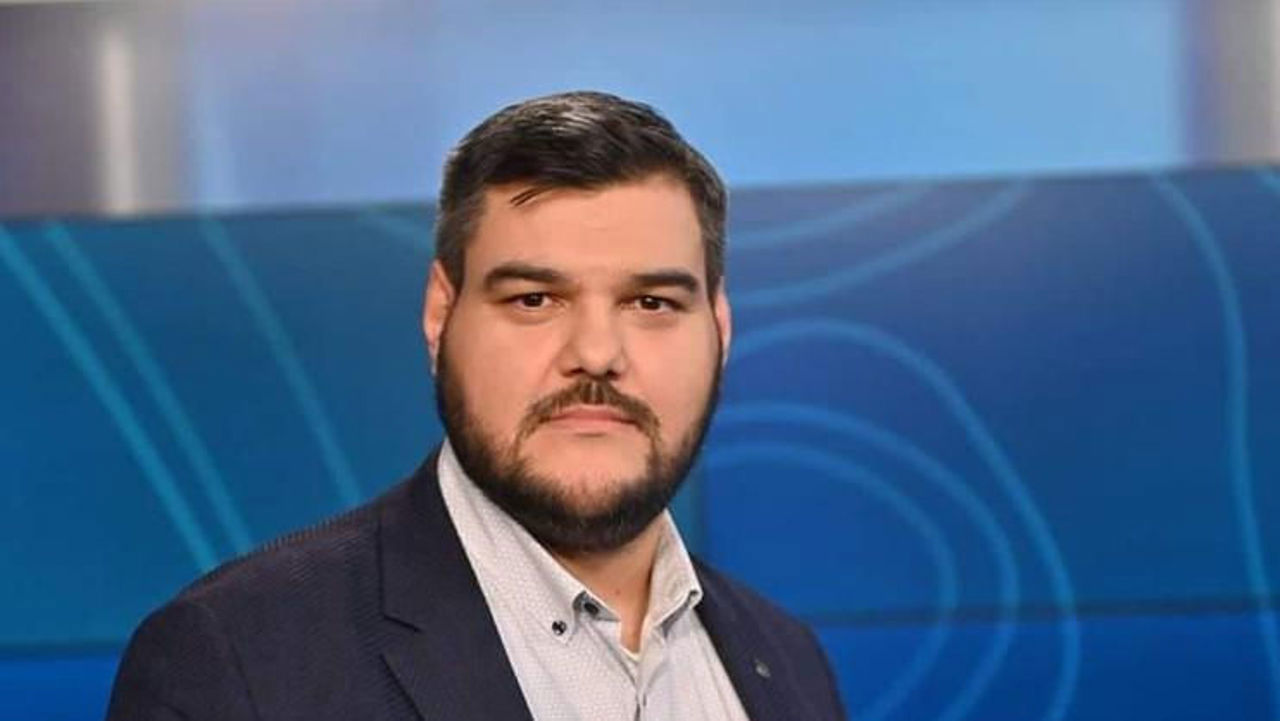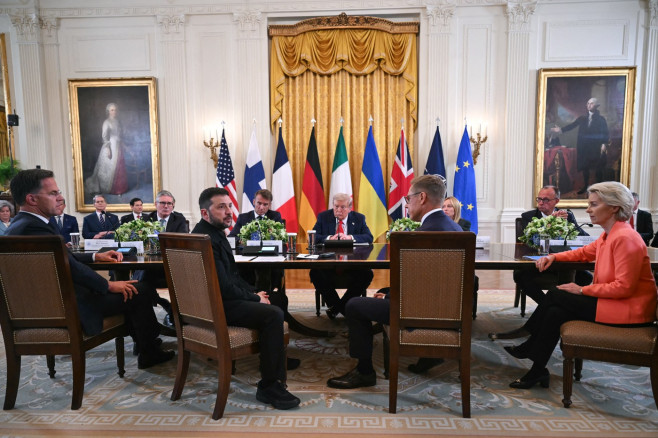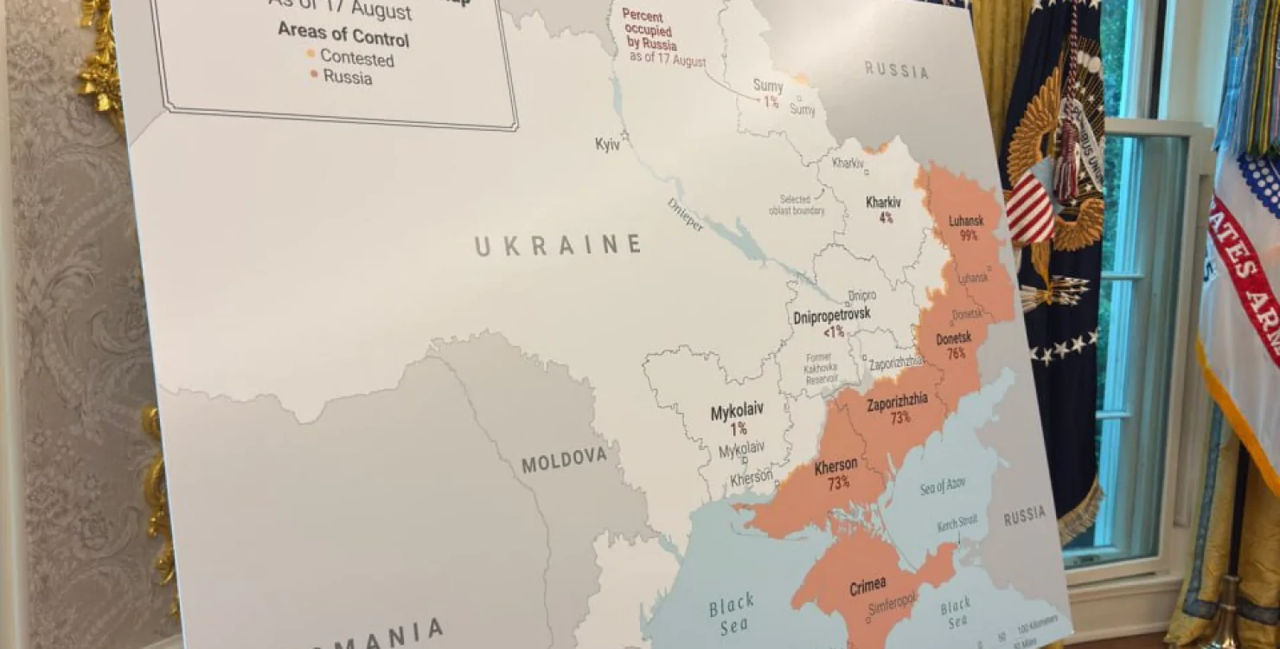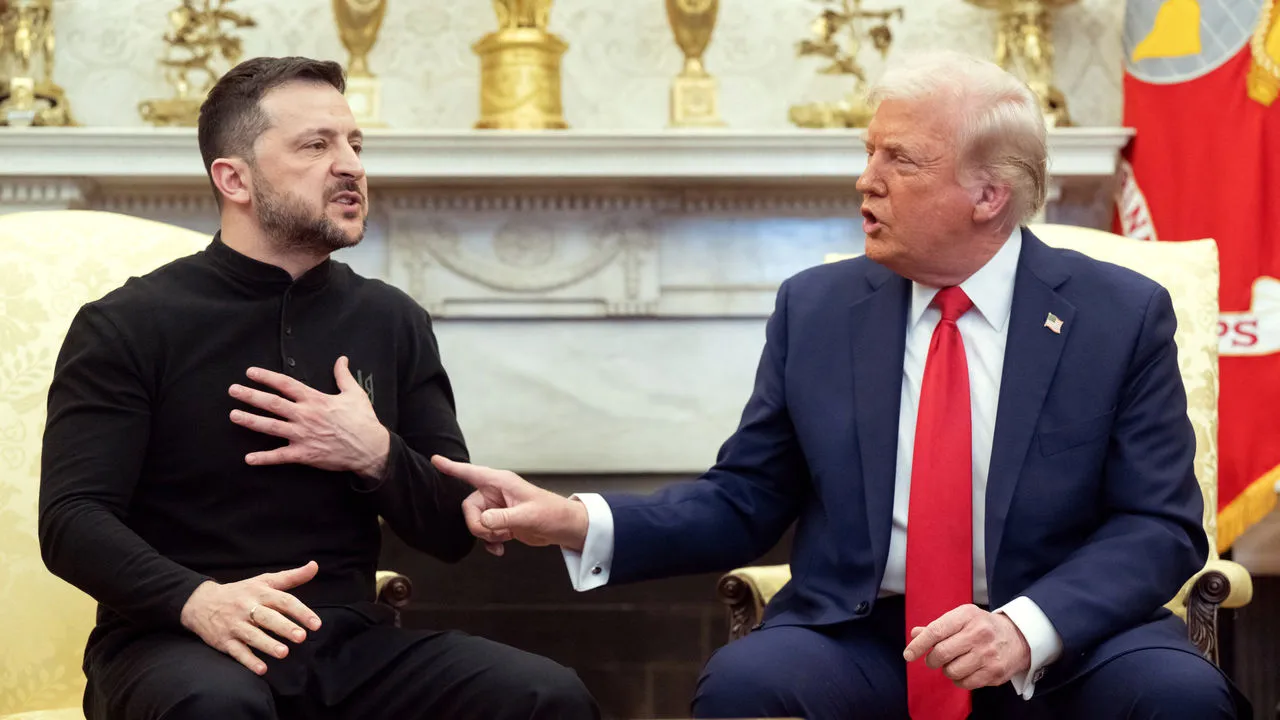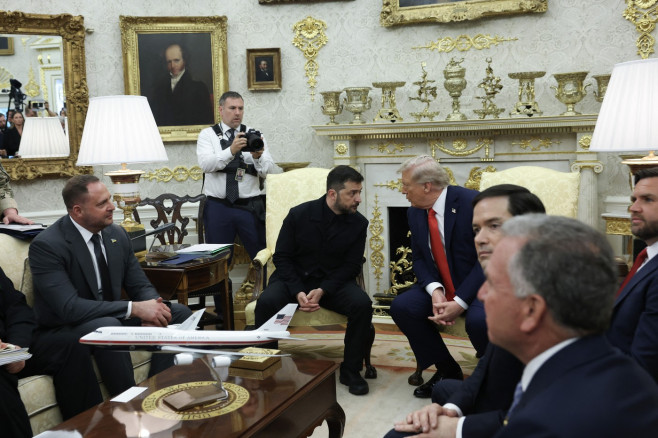
White House Summit // Romanian political analyst: Potential concessions by Ukraine could set dangerous precedent
The attention of millions of people – experts, politicians, military personnel, and citizens from Eastern European countries concerned about the security situation in the region – was focused on Washington, where White House leader Donald Trump discussed with his Ukrainian counterpart, Volodymyr Zelensky, and European leaders about ending the war and providing security guarantees for Ukraine.
Subsequently, Trump spoke by phone with Kremlin leader Vladimir Putin, discussing the organization of a trilateral meeting. Some experts said that peace negotiations took place in Washington, describing Trump-Zelensky meeting as more relaxed and efficient than the previous one held in February.
The two leaders were observed in front of a map of Ukraine, which also featured Moldova and Romania.
What was discussed last night at the White House and the potential impact of Washington summit on Moldova is explained by political analyst of Romania Mihai Isac in an exclusive commentary for MOLDPRES.
„It's too early to talk about peace negotiations”Washington event reaffirmed the European Union's support for Ukraine, but now it is important to follow Russia's actions, which in the expert's opinion is not interested in stopping the fire.
Mihai Isac: We must be extremely attentive to Russia's next steps. We know that Russia uses hybrid diplomacy to prevent the freezing of the situation at the front, to prevent the adoption of a monitoring mechanism, a ceasefire, and I believe it is far too early to talk about the beginning of peace negotiations.
There is a need for many discussions, many meetings between expert groups, and at the same time, we must understand the particularities of the Ukrainian political system, which does not allow President Zelensky to make certain decisions without them being adopted in Parliament. As I was saying, I expect Russia to find new reasons to delay opening negotiations that would lead to a temporary ceasefire and possibly extend this period. Additionally, there are some peculiarities regarding the form of security guarantees that Ukraine will receive, as this state does not seem to have the go-ahead to become a NATO member.
Even earlier, considering the turbulent era of negotiations until now, this summit is a clear signal, a reference point.
Concessions Ukraine has to make will be painful
Concessions that Ukraine has to make will be painful, without necessarily thinking about the territories that will remain under some form of Russian military occupation. It is about people, it is about millions of refugees who most likely will not be able to return to their homes soon, but this summit is a step forward.
We must understand that Donald Trump would also like these negotiations to start as soon as possible, to steer this conflict into a resolution path, especially since 2026 is a very important electoral year in the United States. In the 2026 elections, one-third of the US Senate will be elected, the entire composition of the representatives, and Donald Trump wants to prevent the Ukraine conflict from being used as a political weapon by the Democratic Party. Moreover, European states are also interested in the active phase of this conflict ending. We see the harsh reactions of societies in European states towards the fact that this war has been going on for a very long time.
It is important to note that the war started in 2014, not 2022, so Ukraine has been fighting in one form or another for 11 years against the Russian invasion. We see Ukraine's desire to obtain these security guarantees that will no longer allow Russia to launch new attacks in the future. Also notable is the extremely amiable and diplomatic manner used by Donald Trump and Zelensky in bilateral discussions.
It is a completely different experience from what happened in Oval Office during President Zelensky's last visit. Let's not forget that at that time, some activities were suspended, leading to a deterioration of relations between Kiev and Washington. Zelensky has once again proven his skill at playing at the table of important players in the world's geopolitics, but again, it is far too early to talk about peace in Ukraine.
Moldova must be 'extremely' cautious
We must be extremely cautious. The devil is in the details. We must be extremely cautious about what concessions Ukraine will have to make to implement various ceasefire forms, possibly an armistice, and possibly starting peace negotiations. Because these concessions, which will certainly be both territorial and otherwise, could set a dangerous precedent for Moldova. When I refer to a dangerous precedent, I mean that if we look at Russia's demands, we see that Moscow has not given up its plan to impose the Russian language as an official language, at least in certain regions of Ukraine, and here we refer to Odessa region. Russia has also not given up its plan to demand a protected status for the Russian and Russian-speaking minority in Ukraine. It also demands a special status for the local branch of the Russian Orthodox Patriarchate, and there are even some speculations that Russia will try to achieve de facto federalization of Ukraine.
All these aspects must concern Moldova, considering that our state has also been frequently targeted by ferocious campaigns to force Moldova into becoming a federal state, where pro-Russian components, such as the region under Russian military occupation in the east of the republic and Gagauzia region, would have a say in internal and external politics, including the right of veto concerning Moldova's foreign policy, especially regarding European integration.
It is important for Moldova to be present at these negotiationsRussia's interests in Moldova are known and have not changed much in the last decades. First of all, Russia would like to maintain its military garrison indefinitely in the Transnistrian region. Of course, Russia would like to strengthen the current autonomies in Moldova and possibly autonomize other regions in Moldova to prevent Chișinău from fully exercising control over the entire territory.
We also see certain statements coming from Tiraspol that should concern us about the relations between Tiraspol and Moscow. These threats are not new; they are a constant in Russia's policy towards Moldova. And during these negotiations with Ukraine, it is important for Moldova to be present in one form or another at these negotiations, and Moldova needs to conduct an active lobbying campaign with partner states, especially the United States, to explain Moldova's position, interests, and peculiarities regardless of whether we are in an electoral campaign.
Moldova must not allow Moscow to occupy the propaganda front; we must have no hesitation in using any means to explain our security needs to partner states.
We see that Russia often manages to monopolize discourse regarding the Transnistrian separatist region or Gagauz region, or, if we look, regarding Moldova's relationships with the European Union, and surely we will witness the launch of an active campaign of fake news and conspiracy theories targeting Moldova and weakening its institutional capacity to respond to Russian threats in the coming weeks if not days.
The US has not abandoned Ukraine nor Moldova
We must understand that the United States has not abandoned Ukraine, nor has it abandoned Moldova; President Zelensky's presence at the White House and the fact that President Trump respected the agreed schedule with President Zelensky and European leaders demonstrate how differently Donald Trump treats the leaders of partner states.
It is very clear that Donald Trump does not want to allow Vladimir Putin to drag things out anymore. Let's not forget that until now, Vladimir Putin has managed to stall and significantly hinder the launch of realistic negotiations that could at least lead to a ceasefire until the conflict's final resolution.
International recognition of territorial occupation should concern Moldova
This exact aspect of territorial exchanges or the international recognition of occupying a certain region should concern Moldova. Changing a state's borders in Europe through force in the 21st century did not seem possible, but we see that Russia's externalized political imperialization remains a constant threat to all states. How this aspect of violations is managed will undoubtedly open Pandora's box in the rest of Europe and beyond.
Many unresolved territorial conflicts remain, and there will certainly be state and non-state actors who wish to disturb the status quo and try to resolve these territorial desires by force. First of all, the region demanded by Russia is heavily fortified, preventing the Russian Army from turning the front around Kharkiv. If this region were ceded, it would mean that the Russian Army would have a launching pad to quickly encircle the city of Kharkiv and the Kharkiv region, one of Ukraine's most important, and also a launching pad for an attack towards Ukraine's center.
Ukraine has tried to explain to President Trump that this territorial exchange is not feasible from a military perspective. We will see what conclusions are reached. We must understand that if Ukraine were to accept this territorial cession, it would need to undergo an acceptance process, not only by Parliament from a legislative point of view, but first and foremost by the public. It is an area that has already seen conflict in 2014-2015. Many Ukrainian citizens will not accept concessions that do not satisfy Ukraine's security needs. We will see the next steps in the negotiations.
But, at the same time, we must look at the map. Practically, the regions proposed for retrocession by Russia are not strategic regions like Donbas. It is expected that negotiations for ceding the region or the temporary withdrawal of Ukrainian troops will be a fairly meticulous agreement, and the Ukrainian side will certainly try to obtain as solid security guarantees as possible before taking this step.
Curiosity remains regarding territories in Ukraine under Russian military occupationCuriosity and interest for Moldova remain regarding the status of territories in Ukraine that will remain under Russian military occupation. And we must understand that in this area, we will practically witness the creation of an attack infrastructure by Russia because, certainly, in a few years, we will see new forms of warfare launched against Ukraine and other nations, and we hope Ukraine will withstand because, if we look at the Georgian example.
It is important for Ukraine to identify mechanisms that do not turn Ukraine into a new Georgia, a state that, although suffering significant territorial amputations by Russia, is currently governed by a pro-Russian hybrid dictatorship. We have seen in Georgia, these changes did not happen within a few years, they occurred over about 16 years. Unfortunately, Russia still has the means to influence Ukraine's electoral situation after the active phase of the conflict.
But the fact that, at this moment, Russia does not occupy other important cities in Ukraine, except for Luhansk and Donetsk, guarantees that, at least regarding Moldova, it will not have a direct military linkage, a direct terrestrial connection with the Transnistrian region. It is clear that Ukraine will not accept ceding important cities, such as Odessa, Mykolaiv, or Kherson. So, at least from this point of view, Moldova's security is assured.
Moldova must be extremely cautious so that decisions regarding Ukraine do not set dangerous precedents for Moldova.
What does security guarantees for Ukraine according to Article 5 of NATO Treaty mean?
This is a question that many international law experts try to answer. It is not an easy question, which does not have a simple answer. Mechanisms are being sought to allow NATO states to respond. But, any security guarantees for Ukraine will need the acceptance and support, and direct involvement of the United States. The United States is the only military player within the alliance with strategic troop deployment capabilities, rapid transport capabilities for intervention troops. And US involvement, even if it would just be logistical or in ensuring aerial security, will be a clear signal for Russia. At the NATO states level, there is extensive debate on how this mechanism should look.
There was a discussion about deploying European deterrence forces on Ukrainian territory. These forces would not have direct contact on the front with Russian forces but would be deployed in nearby or behind the front areas. However, this force deployment would be a very costly financial and human effort.
According to figures used by experts, at least 40,000-50,000 soldiers from European states would be needed, and you realize that soldiers must be supported by an entire logistical army, and the human effort put in by different European countries would be enormous, requiring consolidation and an increase in the number of soldiers in European armies.
First of all, Ukraine needs guarantees that it will not be attacked by Russia again, which, once again, seems hard to believe, given the very experiences of Moldova or Georgia. We remember that Russian forces would conclude a ceasefire in the morning and violate it in the afternoon.
It is clear that we should not trust Russia's word, and yes, it is necessary to develop and implement a solid mechanism to provide Ukraine with these security guarantees. Another aspect we must closely examine is the method of monitoring the ceasefire. We are talking about an immense front line, we are talking about the need to deploy maintenance forces, or at least to monitor the ceasefire. Certainly, in this mission, which will be one of the largest launched by various organizations, because it has not yet been decided whether it will be an UN-led mission or by other organizations, this international ceasefire monitoring mission will consist of several tens of thousands of soldiers.
When talking about states that can provide troops, countries from the Global South, such as Brazil, India, South Africa, or even China, will surely be involved. These countries are involved in various peacekeeping missions in other global conflict regions, and it is very likely we will witness such an international ceasefire monitoring mission. This surely does not guarantee the ceasefire and Russia's adherence to it.
Russia's historical precedents in the conflict in the former Soviet space demonstrate that we should not trust Russia's word. Moscow respects only force when it comes to resolving conflicts and establishing a clear ceasefire system.
What did Trump and Zelensky discuss in front of Ukraine map?
If we look closely, on this very carefully prepared map, the percentages from those regions occupied by Russia could be observed. This map aimed to explain to the American side that Russia's demands are unrealistic, exaggerated, and that the proposal involved ceding peripheral regions without significant military importance in exchange for a strongly fortified area by Ukraine. When we are talking about the Ukrainian-controlled Donetsk region, we are practically talking about a fortress.
It is an extremely well-fortified area, where each locality has become a stronghold in itself. This region has been besieged by the Russian side since 2014; we remember moments like Slavyansk, Kramatorsk, so that region acts like a spearhead in the side of Russia's attack setup, and that map aimed to show the American leadership, to explain as simply as possible why the Russian side's demands are exaggerated and that we should not fall into the trap of simplifying the front situation, where a meter of land in Donbas is strategically worth more than a meter of land in another region of the theater of operations. It is not about diminishing the importance of a meter of Ukrainian land; it is about the fact that the area Russia wants to occupy without a fight would offer the invading Russian armies a launching pad for new attacks, regardless of intensity.
What the Ukrainian diplomacy is doing now – and I'm not just referring to official diplomacy, but also to social diplomacy, the activities of civil society in Ukraine, the diplomacy of experts, or that conducted by other components of society – is a model for Moldova. This is how Moldova should also refer to it, not only when talking about relations with Russia, the US, or the EU, but also when speaking about diplomacy in general.
PHOTO GALLERY // Constitutional Court unveiled activity report for last six years
New judges of Constitutional Court could be sworn in on Sunday
Ambassador ends term in Chișinău
Moldova may open embassy in Egypt next year
11th Parliament hosted over 120 official delegations over four years
Last day for submitting documents for electoral bloc registration in parliamentary elections
Moldovan electoral body proposes opening two voting stations each in Russia, Ukraine, Israel
CEC deputy head comments on request to dissolve successor formations of Shor Party
Parliament to convene in special session
Nicolae Testemitanu Medical University of Moldova announces launch of contest on admission to residency
VIDEO // Protests organized by Shor group
DOC // New Electricity Law published in Official Journal
President welcomes US and European leaders' efforts for achieving peace in Ukraine
President of Shor Party's Ștefan Vodă territorial office convicted for complicity in illegal party funding
White House Summit // Romanian political analyst: Potential concessions by Ukraine could set dangerous precedent
DOC // Published in Official Journal. Moldova to have national crisis management system
Austria's Federal Minister for European and International Affairs to visit Chișinău
Two political parties and potential independent candidate learned preliminary order on ballot
Chief architect of central Moldova district prosecuted for corruption; anti-corruption officers raid more locations across country
VIDEO // First advanced technology park - Moldova HiTech Park - to be built in Stăuceni
Work of Palanca–Maiaki–Udobnoe customs post temporarily suspended
CEC warns of fake video images on electoral process
Two candidates for Prosecutor General's Office to be interviewed by CSP
National contest of young, elderly people discovering Europe together starts in Moldova
Supreme Court of Justice delivered first verdict in Russian Laundromat cases

